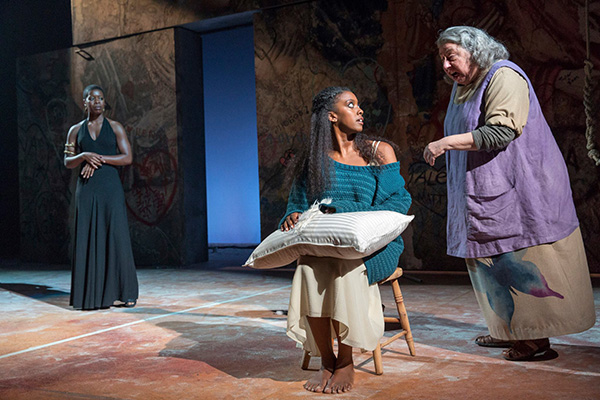
The worlds of “Pirates of the Caribbean” and “Romeo and Juliet” feel as though they exist in different universes. One reminds audiences of Hollywood’s fascination with handsome men embroiled in swordfights, while the other evokes memories of grueling high school essays, the dread of pop quizzes and the horror of Elizabethan English. But in David Leveaux’s Broadway adaptation of “Romeo and Juliet,” now playing at the Richards Rodgers Theatre, these two worlds are connected by the presence of Orlando Bloom.
Bloom stars as Romeo, opposite Condola Rashad as Juliet, in a modern-day version of the classic story. The play literally starts with a bang — a jarring explosion at the beginning of the show is accompanied by a sudden blackout and fire.
However, these gimmicks feel cheap during the play. It is unnecessary for Bloom to make his first entrance on a motorcycle, which is absent for the rest of the play. And while the fiery stage effects are impressive, they serve little purpose. Shakespeare plays do not require these types of stunts for a sense of vitality.
In many ways, this production of “Romeo and Juliet” feels like Bloom’s show, and his star persona helps fill many of the seats. His performance is quite good, considering this is his first time both on Broadway and performing Shakespeare. His co-star Rashad also plays her part well. At 26, she is a decade younger than Bloom and plays an almost shockingly youthful Juliet, who is only meant to be 13.
However, the supporting cast carries the production. Shakespearean English rolls out of the mouths of stage veterans like Jayne Houdyshell and Chuck Cooper with such effortlessness one would think they spoke in verse at home. The younger actors also exhibit a wonderful ease with the language as they liven the stage with full-bodied gestures.
The design elements are also superb. David Weiner’s lighting is beautiful, and subtle shifts in color projected onto the back screen aid every scene change and clarify the passage of time. Jesse Poleshuck’s set is elegant and simple from the opening of the play to the end. The famous balcony scene appears strikingly because the balcony itself is so visually pleasing. At one point, the sparseness and beauty of a simple sunrise is almost heartbreaking.
Despite the high-quality production and talented actors, this adaptation of “Romeo and Juliet” suffers from its own bombasity. True Shakespeare fans will be turned off by the play’s obnoxiously sensationalist elements, while high school English classes will still be dozing off, except during the brief appearance of Bloom riding on a motorcycle.
A version of this article appeared in the Tuesday, Oct. 1 print edition. Ivy Olessen is a contributing writer. Email her at [email protected].























































































































































